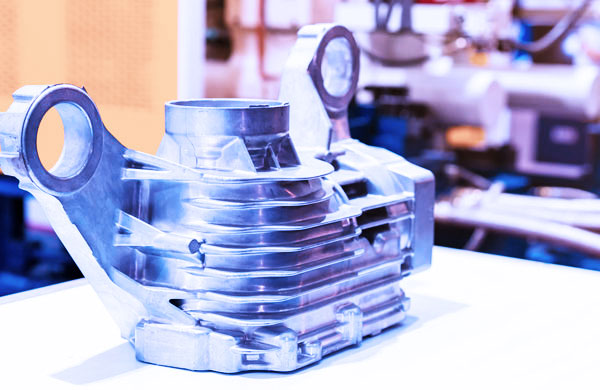The Ultimate Guide To Alcast Company
The Ultimate Guide To Alcast Company
Blog Article
7 Easy Facts About Alcast Company Explained
Table of ContentsThe Ultimate Guide To Alcast Company4 Simple Techniques For Alcast CompanySome Known Details About Alcast Company Alcast Company - An OverviewThe 10-Second Trick For Alcast CompanyIndicators on Alcast Company You Should Know
Chemical Contrast of Cast Light weight aluminum Alloys Silicon promotes castability by decreasing the alloy's melting temperature level and improving fluidity throughout casting. Furthermore, silicon adds to the alloy's strength and wear resistance, making it valuable in applications where longevity is important, such as automobile parts and engine components.It likewise enhances the machinability of the alloy, making it much easier to refine into finished items. By doing this, iron adds to the total workability of light weight aluminum alloys. Copper enhances electric conductivity, making it useful in electric applications. It also improves rust resistance and contributes to the alloy's general toughness.
Manganese adds to the stamina of aluminum alloys and boosts workability (Aluminum Castings). It is frequently made use of in wrought light weight aluminum products like sheets, extrusions, and accounts. The existence of manganese aids in the alloy's formability and resistance to cracking throughout manufacture processes. Magnesium is a light-weight component that offers toughness and impact resistance to light weight aluminum alloys.
6 Simple Techniques For Alcast Company
It permits the production of lightweight elements with excellent mechanical residential or commercial properties. Zinc boosts the castability of light weight aluminum alloys and assists control the solidification procedure during spreading. It improves the alloy's toughness and solidity. It is commonly discovered in applications where elaborate shapes and fine information are required, such as ornamental spreadings and particular auto parts.

The key thermal conductivity, tensile strength, return strength, and elongation vary. Among the above alloys, A356 has the highest possible thermal conductivity, and A380 and ADC12 have the lowest.
Alcast Company for Beginners

In precision casting, 6063 is fit for applications where complex geometries and high-quality surface area finishes are vital. Examples include telecommunication rooms, where the alloy's premium formability permits for smooth and aesthetically pleasing styles while keeping architectural integrity. In the Illumination Solutions industry, precision-cast 6063 components create elegant and effective lighting fixtures that need detailed forms and great thermal efficiency.
It brings about a better surface coating and better corrosion resistance in A360. The A360 displays premium prolongation, making it optimal for complicated and thin-walled elements. In accuracy spreading applications, A360 is well-suited for sectors such as Consumer Electronics, Telecommunication, and Power Devices. Its improved fluidity permits intricate, high-precision elements like smartphone casings and communication device housings.
Getting The Alcast Company To Work
Its unique buildings make A360 a useful option for accuracy spreading in these sectors, improving product resilience and quality. Aluminum alloy 380, or A380, is a widely made use of casting alloy with numerous unique characteristics. It offers excellent castability, making it an optimal selection for precision casting. A380 shows great fluidity when molten, making certain intricate and thorough mold and mildews are precisely replicated.
In accuracy spreading, aluminum 413 shines in the Consumer Electronics and Power Equipment markets. This alloy's superior corrosion resistance makes it an exceptional selection for exterior applications, making sure long-lasting, resilient items over here in the pointed out sectors.
Unknown Facts About Alcast Company
As soon as you have made a decision that the aluminum pass away casting process appropriates for your project, an important next action is choosing one of the most proper alloy. The aluminum alloy you select will significantly impact both the spreading procedure and the homes of the last product. Since of this, you must make your decision thoroughly and take an enlightened technique.
Determining the most suitable aluminum alloy for your application will certainly mean weighing a vast selection of characteristics. These comparative alloy characteristics follow the North American Pass Away Casting Organization's standards, and we've divided them into 2 categories. The first classification addresses alloy characteristics that influence the manufacturing process. The second covers attributes impacting the buildings of the end product.
Examine This Report about Alcast Company
The alloy you pick for die spreading directly affects several facets of the casting procedure, like just how easy the alloy is to collaborate with and if it is vulnerable to casting flaws. Warm splitting, also referred to as solidification cracking, is a common die spreading issue for light weight aluminum alloys that can lead to interior or surface-level tears or fractures.
Specific light weight aluminum alloys are more vulnerable to warm fracturing than others, and your selection ought to consider this. Another usual defect found in the die spreading of light weight aluminum is pass away soldering, which is when the cast adheres to the die walls and makes ejection challenging. It can damage both the cast and the die, so you need to try to find alloys with high anti-soldering properties.
Deterioration resistance, which is currently a remarkable quality of light weight aluminum, can vary considerably from alloy to alloy and is an important characteristic to think about depending on the environmental problems your item will be revealed to (Aluminum Casting). Put on resistance is an additional home commonly sought in aluminum products and can differentiate some alloys
Report this page